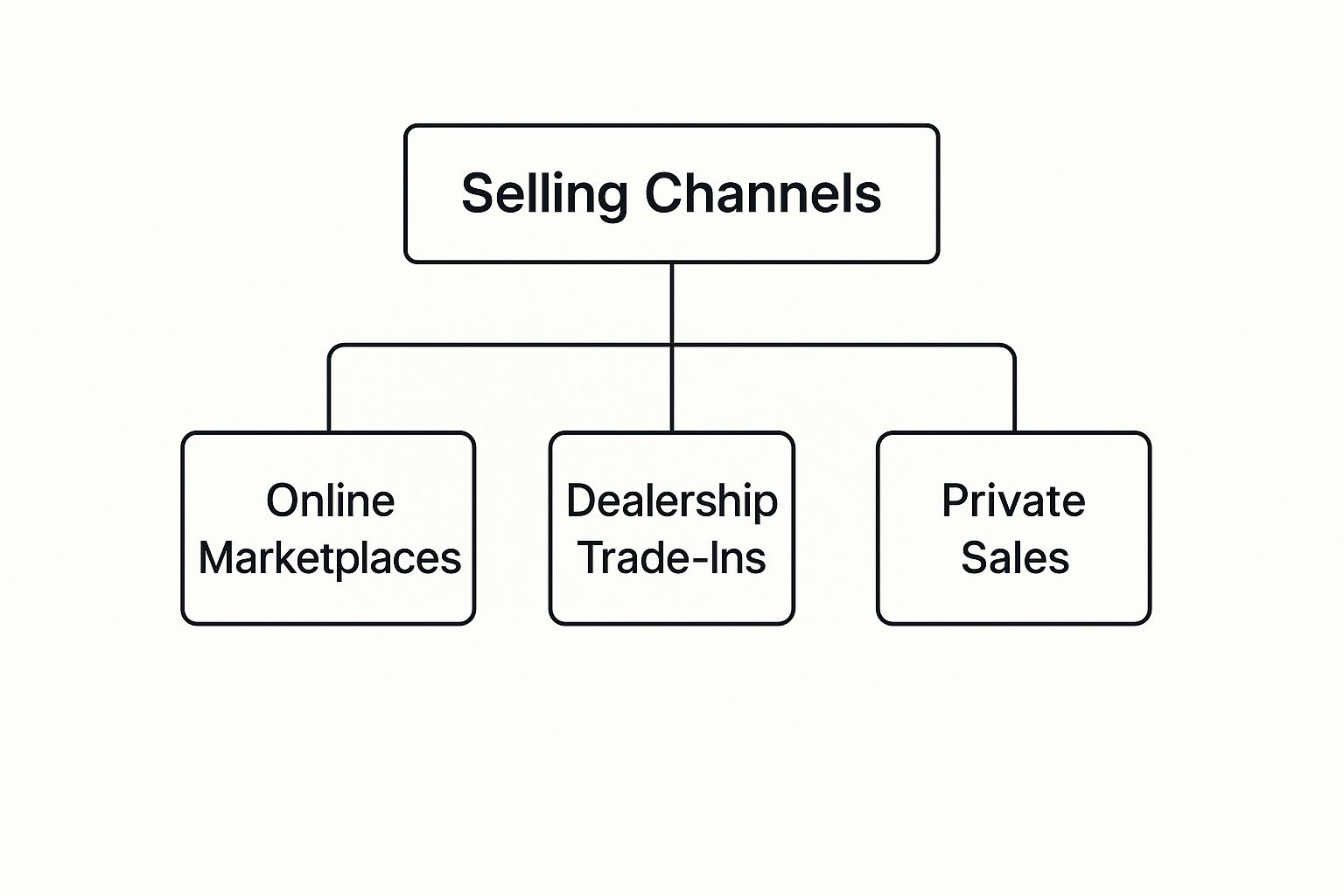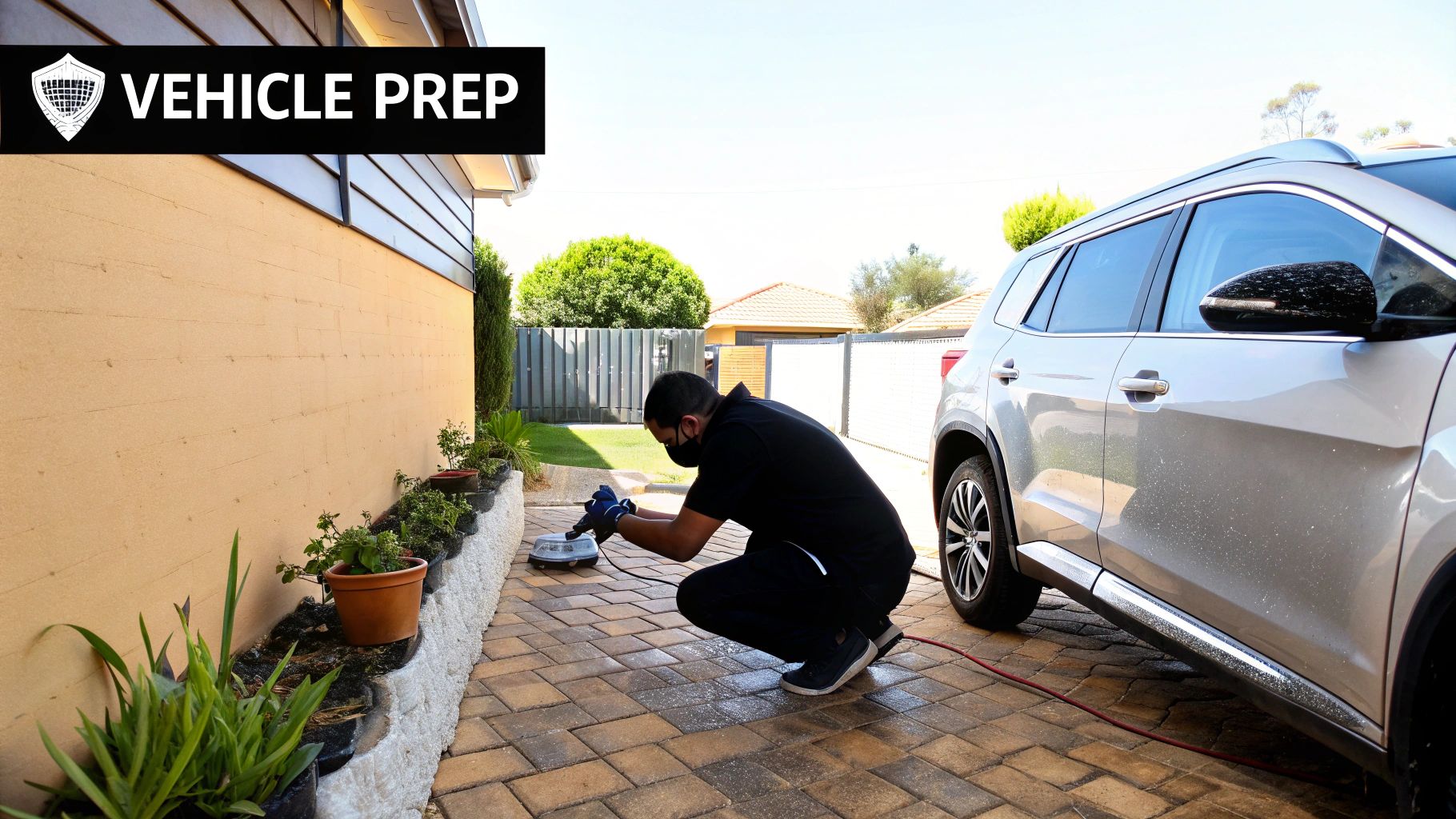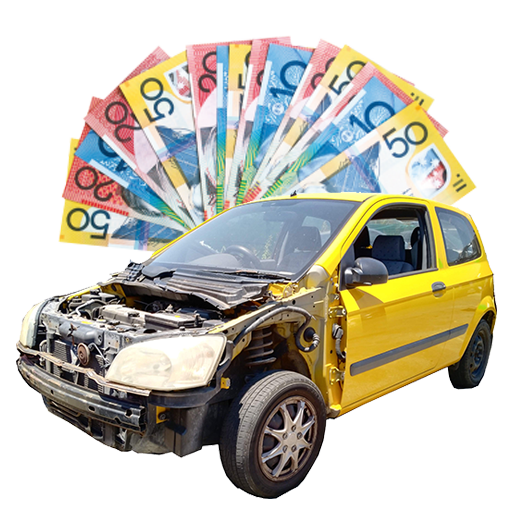When you're ready to sell your car in Australia, it all really comes down to a trade-off. What do you value most: money, time, or convenience? Getting your head around this is the first step.
Your main paths are a private sale if you're chasing the highest profit, a dealership trade-in for sheer simplicity, or an online car buyer which offers a neat balance between the two. Knowing the pros and cons of each is key to making a choice you won't regret later.
A Framework for Selling Your Vehicle
There's no single "best" way to sell a car; there's only the best way for you and your specific situation. Each method comes with its own set of benefits and drawbacks, so your personal priorities will point you in the right direction. Are you determined to squeeze every last dollar out of the sale and have the time to do it? Or do you just want the car gone, fast and without any fuss?
Think of it this way: selling privately is like setting up a mini-business. You’re the marketer, the salesperson, and the finance department, but you get to keep all the profit. A dealership trade-in is the complete opposite—it’s a full-service option where they do all the heavy lifting, but their convenience comes at a price, which is a lower offer for your car.
This image gives a great visual breakdown of the main selling channels.

As you can see, every seller starts at the same point, but the journey changes depending on what you want to achieve at the end.
Key Factors to Consider
Before we dive into the nitty-gritty of each option, take a minute to think about what's most important to you. A little self-assessment now will save you a lot of headaches later.
- Your Desired Price: Are you holding out for top market value, or would you happily take a bit less for a quick and easy sale?
- Your Available Time: Do you have the spare time on evenings and weekends to create listings, field calls, and arrange viewings with strangers?
- Your Comfort Level: How do you feel about haggling over price, sorting out the official paperwork, and making sure you get paid securely?
By figuring out your priorities upfront, you can pick a selling strategy that actually fits your life. It makes the whole process smoother and ultimately more rewarding. Let’s walk through each path so you have all the info you need to make the right call.
The Private Sale: More Work for More Cash
If your number one goal is to get the absolute most money for your car, selling it privately is the way to go. There’s no question about it. When you sell directly to another person, you’re cutting out the dealership middleman and pocketing the profit they would have made. Yes, it takes more work, but the financial payoff can be huge.
Think about it this way: a dealer gives you a wholesale price. They have to buy low so they can cover their costs (rent, staff, advertising) and still make a profit when they sell it at the higher retail price. By selling it yourself, you get to aim for that retail price, and the difference can easily be thousands of dollars in your bank account.
This path puts you in the driver's seat for the entire sale, from setting the price to handing over the keys. It’s definitely the most hands-on option, but that control and the extra cash make it well worth the effort for most people.

Making Your Advert Stand Out
Your online ad is your shop window. It’s the first impression a potential buyer will have, so you need to make it count. A great ad doesn’t just list specs; it tells the car's story and builds a bit of trust right from the first click.
Good photos are absolutely essential. Get outside in good light and take clear pictures from every angle—front, back, both sides, and each corner. Then, move inside. Get detailed shots of the dashboard, seats, boot, and even under the bonnet. And be honest. If there's a noticeable scratch or a small dent, take a photo of it. It shows you're not hiding anything and saves everyone from nasty surprises later.
Next up is the description. Write a clear, honest summary. Start with the essentials (year, make, model, kilometres, transmission), then move on to the good stuff that makes your car a great buy.
- Service History: A full logbook history is a massive selling point. Mention it!
- Recent Work: Have you put on new tyres? Just had it serviced? List any recent big-ticket items.
- Special Features: Does it have a sunroof, leather seats, or modern safety tech? Highlight these desirable extras.
- Why You're Selling: A simple, honest reason like "Bought a 4WD for the family" builds a lot of confidence.
Your ad’s main job is to pull in serious buyers and weed out the time-wasters. A detailed, upfront listing signals that you're a responsible owner, which gives people the confidence to get in touch.
Handling Enquiries and Test Drives
Once your ad is live and the messages start rolling in, you’ll need to switch hats and become a salesperson. Be ready to answer questions quickly and politely. Serious buyers will want to see the car in person and take it for a spin, and you need to manage this part carefully.
For safety's sake, always arrange to meet in a public place during the day. It’s also smart to have a friend or family member with you. Before anyone gets behind the wheel, ask to see their driver's licence and snap a quick photo of it on your phone. Most importantly, you must go with them on the test drive. Never, ever let a stranger drive off in your car alone.
Juggling all this can take time, but it’s a non-negotiable part of the process. If you’re feeling a bit overwhelmed, especially with local rules and expectations, there are resources that can help. For instance, if you’re looking to https://autoremovaladelaide.com.au/sell-my-car-adelaide/, checking out a location-specific guide can offer some great tailored advice.
At the end of the day, selling privately is a classic trade-off. You put in your own time and effort to market the car, chat with buyers, and handle the paperwork. In exchange, you get the best possible price for it.
Trading In Your Car at a Dealership? It's All About Convenience
If the thought of selling your car yourself makes you tired just thinking about it, a dealership trade-in might be the perfect solution. This is the go-to option for anyone who values a quick and simple process over squeezing every last dollar out of their car.
The appeal is simple: you drive your old car to the dealership, agree on a price, and that value is put towards the new car you're buying from them. You drive away in your new wheels, leaving the old one behind. It's one transaction, all wrapped up in a neat little bow. No ads to write, no strangers calling at odd hours, and no coordinating test drives. The dealer handles all the fiddly paperwork like transferring the registration, which is a huge weight off your shoulders.
You're essentially paying for a service with the lower price you get. That service is a guaranteed, instant sale without any of the usual headaches.
The Financial Reality of a Trade-In
Let's be clear: convenience comes at a cost. A dealership will offer you a wholesale price for your car. This is less than the retail price you might get from a private buyer because the dealer needs to cover their own costs—detailing, potential repairs, and their profit margin—before they can sell it on the lot.
That gap between wholesale and retail can feel pretty big. However, there's a small silver lining. In some Australian states, the trade-in value is deducted from the new car's price before stamp duty is calculated. This can give you a nice little tax saving that helps to soften the blow.
A dealership trade-in is the path of least resistance. You're swapping a higher potential price for an immediate, guaranteed sale, skipping all the work and uncertainty of finding a private buyer.
How to Get the Best Possible Trade-In Offer
Even though you’re accepting a wholesale price, it doesn't mean you have to take the first number they throw at you. A little preparation can make a real difference to your bottom line.
- Do Your Homework: Before you even set foot in a dealership, get an idea of your car's wholesale value. Jump on a few online car valuation sites to get a realistic ballpark figure.
- Shop Around: Don't just settle for the first offer. Take your car to at least two or three different dealerships and see who's willing to give you the most for it. Let them compete for your business.
- Make a Good First Impression: A clean car just looks like it's been cared for. Give it a proper wash and vacuum, and bring your service logbook. It shows you've been a diligent owner, which gives the dealer more confidence.
This whole process is becoming more common as dealerships get more involved in the used car market. The Australian Automotive Dealer Association recently pointed out that dealers now account for 52.5 percent of all used vehicle listings and 45.4 percent of sales. That's a huge jump from the year before.
Because dealers are playing a bigger game now, they're more eager to get their hands on good quality used cars, which can definitely work in your favour. You can read more about these market shifts in the April Automotive Insights Report.
At the end of the day, trading in your car is a personal choice. If your time is precious and you’d rather avoid the drama of a private sale, the sheer ease of a dealership trade-in is tough to beat.
Tapping into Online Car Buying Services and Marketplaces
So, you're not keen on the lowball offers from a dealership, but the thought of handling a full-blown private sale gives you a headache. This is where the internet comes in, offering a fantastic middle ground that can give you the best of both worlds.
Online, you generally have two main paths. You can list your car on a huge marketplace, essentially a digital noticeboard for car buyers across the country. Or, you can opt for an instant car-buying service that gives you a quick, guaranteed offer and takes the car off your hands in a flash.
The Carsales homepage, for example, is a common starting point for anyone looking to sell their car online. It's designed to get you straight into the action.

As you can see, the platform immediately prompts you to start the selling process, connecting you with its massive audience of potential buyers right from the get-go.
Selling on Digital Marketplaces
Think of online marketplaces as the modern-day equivalent of sticking a "For Sale" sign in your car window, except your window is now visible to the entire country. You’re in the driver's seat: you create the listing, upload the photos, write the description, and set the price. Then you wait for the messages and calls to roll in.
The good news? You get access to thousands of potential buyers. The catch? You're also competing with thousands of other sellers. To make your car stand out from the crowd, your listing needs to be absolutely spot-on.
- Photos are everything: High-quality images are not a suggestion; they're a requirement. Give your car a thorough clean, inside and out, and take photos in good, even light. Make it shine.
- Tell the whole story: Be honest and detailed in your description. Mention the full service history, any recent repairs, and what makes your car special. Transparency builds trust and weeds out time-wasters.
- Price it right: Do your homework. See what similar cars are listed for on the same platform. Price it too high, and your phone will stay silent. Price it too low, and you're just giving money away.
This digital approach is powering a massive industry. The Australian used car market was valued at around USD 77.2 billion and is forecast to climb to an incredible USD 197 billion. This boom is largely thanks to how easy it's become to sell vehicles on these online platforms. You can dig deeper into the expanding Australian used car market on imarcgroup.com.
Using Instant Car Buying Services
If speed and certainty are your top priorities, instant car-buying services are a game-changer. These companies offer a totally different experience. Forget dealing with tyre-kickers and haggling—you get a fast, firm cash offer, plain and simple.
The entire model is built for one thing: getting the deal done quickly. You pop your car's details into their website, get a valuation, and if you like the number, you book a quick inspection. A final, guaranteed offer is confirmed right then and there.
Here’s how it usually unfolds:
- Online Valuation: Punch in your car's make, model, year, and kilometres on their website to get an instant estimate.
- Quick Inspection: An expert will give your car a quick once-over in person to make sure its condition matches what you described.
- Final Offer and Payout: You receive a guaranteed cash offer. If you accept, the payment is often processed on the spot, and they handle all the paperwork.
This path is perfect if you need the cash now or simply can't be bothered with the time and effort of a private sale. For anyone considering this option, looking into services offering instant cash for cars can be a great way to secure a fast, straightforward sale.
Sure, the final price might be a little less than you'd get from a top-dollar private sale, but for many people, the convenience of a guaranteed, hassle-free transaction is a trade-off they're more than happy to make.
Got Something a Bit Different? Selling Unique or Older Cars
So, what do you do when your car doesn't neatly fit into the usual boxes? A classic beauty, a high-end sports car, or an old runabout that’s seen better days won't appeal to the same crowd as a standard five-year-old sedan.
The good news is, there are specialised avenues just for these vehicles. You can still get a great result, whether your car is a collector's item or destined for the scrap heap. It’s all about knowing where to go.
Cashing In on Clunkers: Selling to Auto Wreckers
Let's be honest, some cars have simply reached the end of the road. If your vehicle is old, seriously damaged, or officially written off, your focus shifts from finding a new owner to getting a fair price for its raw materials.
This is where auto wreckers and cash-for-car services shine. They provide a quick, no-nonsense way to dispose of your vehicle and get a bit of cash in your pocket.
Wreckers are experts at seeing the value in what’s left. They buy end-of-life vehicles to salvage any working parts and recycle the scrap metal. The process couldn't be simpler – you call them up, give them the details of your car (make, model, and condition), and they’ll give you a quote right then and there.
The price they offer is usually based on the car's weight and the value of key components like the engine, gearbox, or catalytic converter.
The biggest win here is the sheer convenience. They almost always offer free towing, come to your location, and pay you cash on the spot. It's the ultimate hassle-free solution for a car that’s not going anywhere on its own.
If you're in South Australia, it’s worth checking out local services. You can get a good idea of how to get cash for cars in Adelaide for old cars and see just how easy it can be.
The VIP Treatment: Using Consignment for Specialty Cars
Now for the other end of the scale: classic, luxury, or otherwise unique vehicles. Trying to sell one of these privately can feel like a full-time job. Finding a buyer who truly understands its value requires a specific network and a lot of patience.
This is exactly why selling on consignment is such a smart move.
Think of it like hiring a real estate agent for your car. You hand it over to a specialised dealership that knows the market for your type of vehicle, and they take care of everything for a set fee or a commission on the sale.
Here’s the typical flow of a consignment sale:
- The Handshake: You and the dealer agree on the terms, including the minimum price you'll accept and their commission.
- The Showcase: The dealer puts their professional marketing machine to work, using their showroom, website, and exclusive client list to attract serious buyers.
- The Deal: They handle all the test drives, negotiations, and mind-numbing paperwork.
- The Payout: Once the car is sold, you get the final sale price, minus the dealer's fee.
Consignment gives you the best of both worlds. You get the higher price of a private sale without any of the legwork, making it the perfect route for high-value and one-of-a-kind vehicles.
Preparing Your Car to Get the Best Possible Price
It doesn't matter which path you take to sell your car—a little bit of prep work goes a long, long way. Putting in the effort beforehand can seriously boost the final sale price. Think of it like staging a house before an open home; you’re showing off its best side to make a killer first impression that puts more cash in your hand.
A clean, well-presented car sends a clear message to potential buyers: this vehicle has been looked after. That simple fact builds confidence, whether you're dealing with a private buyer inspecting every little detail or a dealership appraiser who's trained to find reasons to knock down their offer. A small investment in presentation can pay for itself many times over.
This isn't about hiding problems. It's about showcasing your car's genuine value. Two things will give you the biggest bang for your buck: a proper, deep clean and getting all your paperwork in order.
The Power of a Professional Deep Clean
First impressions are almost entirely visual, and let's be honest, a sparkling car just looks like it's worth more. I’m not talking about a quick trip through the local car wash, either. A real detail makes the car look, feel, and even smell years younger, which can easily add hundreds of dollars to what a buyer is willing to pay.
For the biggest impact, focus your energy here:
- Exterior Shine: Give it a thorough wash, a good wax, and a tyre shine to make it pop. Get those wheels and windows properly clean—no streaks!
- Interior Revival: Vacuum everything. I mean everything—under the seats, in the boot, every little crevice. Wipe down the dash, door panels, and centre console, and tackle any upholstery stains with a dedicated cleaner.
- Declutter Completely: Get all your personal stuff out. A buyer needs to imagine it as their car, not see your old receipts and gym bag in the back.
A meticulously cleaned car sends a strong subconscious message: "This vehicle has been well-maintained." This simple act builds immediate trust and can be the deciding factor for a buyer on the fence.
Organising Your Paperwork and History
Having a neat folder with your car's history is just as crucial as its physical appearance. It’s tangible proof of ownership and a solid maintenance record—a massive plus for any smart buyer. It tells them you’ve been a responsible owner with nothing to hide.
Make sure you round up these essential documents:
- Logbook and Service History: This is your golden ticket. A fully stamped logbook showing regular servicing is one of the most valuable things you can have when selling a car.
- Registration Certificate: You’ll need this to prove the car is legally registered.
- Owner's Manual: It’s a small touch, but having the original manual shows you’ve cared for the car.
- Receipts for Major Work: Replaced the tyres, battery, or timing belt recently? Keep those receipts. They’re proof you’ve recently invested money into the car.
To make sure you haven't missed anything, using a car maintenance checklist printable can be a huge help.
Being upfront about your car’s condition and having the documents to back it up smooths out negotiations and helps you justify a higher price. It's an easy win that builds credibility, especially with dealerships looking for quality stock. And they're definitely looking—dealer listings recently hit a record 339,742 vehicles as they grow their share of the market. You can find more insights on used vehicle market trends on autograb.com.au.
Frequently Asked Questions About Selling Your Vehicle

Selling your car for the first time? It’s completely normal to have a few questions swirling around. Getting the final steps right is crucial, so let’s clear up some of the most common queries we hear from sellers.
We'll cover the essential paperwork, how to nail your asking price, and whether it’s a good idea to take a deposit.
What Paperwork Do I Need to Sell My Car in Australia?
Getting your documents sorted is non-negotiable. While the specifics can differ a little from state to state, there’s a standard set of paperwork you’ll need to make the sale official and legal.
Generally, you'll need to have these on hand:
- Proof of Ownership: This is simply to show that you actually have the legal right to sell the car.
- Vehicle Registration Certificate: A must-have for transferring the registration into the new owner's name.
- A Roadworthy Certificate (RWC): In most states, it’s on you, the seller, to provide this certificate to prove the car is safe.
- Completed Notice of Disposal: This is the form you submit to your local transport authority to tell them the car is no longer yours.
Pro Tip: Having the car's original logbook and a detailed service history is a massive selling point. While not always a legal requirement for the sale itself, this kind of documentation builds huge trust with buyers and often lets you ask for a higher price.
How Do I Determine a Fair Asking Price for My Car?
Figuring out the right price is a bit of a balancing act. Aim too high, and you'll scare everyone off. Go too low, and you're leaving cash on the table. The key is to do a little homework to find that "just right" number.
Your best bet is to start by browsing online marketplaces like Carsales or Gumtree. Search for cars with the same make, model, age, and kilometres as yours. This will give you a real-world snapshot of what people are actually paying.
It's also smart to get a few online valuations from instant buyers. This will give you a baseline trade-in value. For a private sale, a good strategy is to set your price somewhere in that market range, adding a small amount on top to leave yourself some wiggle room for negotiation.
Is It Safe to Accept a Deposit for a Private Car Sale?
Absolutely. Taking a deposit isn't just safe—it's a smart and standard part of any private sale. It shows the buyer is serious and has the funds to back up their offer, which instantly helps you weed out the time-wasters.
Just make sure you do it properly. Whenever you accept a deposit, give the buyer a detailed written receipt. This is your safety net and theirs.
It should clearly state:
- The vehicle's full details (make, model, VIN).
- The deposit amount paid.
- The total agreed-upon price.
- The date the final payment and vehicle handover will happen.
This simple piece of paper creates a clear agreement and prevents any "he said, she said" arguments down the track.
If your car is getting on in years, has seen better days, or just isn't worth the hassle of a private sale, Auto Removal Adelaide offers a fast, profitable alternative. We pay instant cash for unwanted cars, offering up to $8,999 with free vehicle removal anywhere in Adelaide. Turn that old car into cash today. Find out more at https://autoremovaladelaide.com.au.


